Every morning, thousands of children walk into school with a pill in their pocket, an inhaler in their backpack, or an epi-pen in their lunchbox. For many, these aren’t just items-they’re lifelines. But if the school doesn’t know how to give them correctly, or if the paperwork is missing, that lifeline can fail. The truth is, school medications aren’t optional. They’re essential. And as a parent, you’re not just dropping off a bottle-you’re handing over responsibility for your child’s health during the hours you can’t be there.
Why School Medication Rules Exist
It’s not about bureaucracy. It’s about safety. In 2024, the American Academy of Pediatrics reported that 40 to 50% of school-aged children take daily medication for conditions like asthma, ADHD, diabetes, seizures, or severe allergies. That’s nearly half of every classroom. Without clear rules, mistakes happen. A child gets the wrong dose. The wrong kid gets the medicine. The inhaler expires. The nurse can’t find the form. These aren’t hypotheticals-they’re real events that lead to hospital visits, missed school days, and sometimes worse.
The solution? The 5 Rights of medication administration: right student, right medication, right dose, right route, right time. These aren’t suggestions. They’re the bare minimum. Schools that follow them reduce medication errors by up to 75%. That’s not a nice-to-have. It’s the difference between a child feeling okay and a child in crisis.
What Parents Must Do Before School Starts
You can’t just show up on the first day with a bottle of pills and hope for the best. Every school district requires formal paperwork-no exceptions. Here’s what you need to get done, in order:
- Get a signed Physician/Parent Authorization Form from your child’s doctor. This isn’t a prescription slip. It must include: your child’s full name, the exact medication name (brand and generic), dosage (e.g., 5 mg, not "one pill"), how often (e.g., "twice daily at 8 a.m. and 4 p.m."), the route (oral, nasal spray, injection), how long it’s needed, possible side effects, and any special instructions like "take with food" or "do not crush." The doctor must also include their license number.
- Sign the form yourself. Parental consent is legally required. Schools cannot give medication without it.
- Submit the form by June 1 if possible. New York City Public Schools and others strongly recommend this to avoid delays. Waiting until September? Your child might miss a week of medication.
- Deliver the medication in person. Never let your child carry it to school-even if they’re responsible. The medication must come in its original, unexpired container with the pharmacy label intact. No ziplock bags. No pill organizers. No unlabeled bottles.
- Allow at least 15 minutes to meet with the school nurse. You’ll both sign a receipt confirming the medication was received. Keep a copy for yourself.
Some schools now use electronic systems called eMARs (electronic Medication Administration Records). These replace paper logs and cut down on errors. But even with digital systems, the original paper form and labeled bottle are still required.
Storage and Handling: What Schools Must Follow
Medications aren’t kept on a desk or in a drawer. They’re locked up-because they’re not candy. The National Association of School Nurses says all medications must be stored in a secure, temperature-controlled location, accessible only to trained staff.
- Refrigerated meds (like insulin or some biologics) must be kept between 2°C and 8°C (36°F-46°F) in a dedicated fridge-never the staff lunchroom fridge.
- Controlled substances (like ADHD stimulants) are stored in a double-locked cabinet, often with a separate key held by the nurse.
- Epinephrine auto-injectors (EpiPens) are kept in an easily accessible emergency kit, not locked away.
And here’s something parents often don’t realize: if your child’s medication expires during the school year, the school must stop giving it. No exceptions. You must provide a new, current bottle. Same goes for any change in dosage or timing. If your child’s asthma inhaler dose goes from 1 puff to 2 puffs, you must submit a new form immediately. Failure to update this information contributes to 18% of reported medication errors.
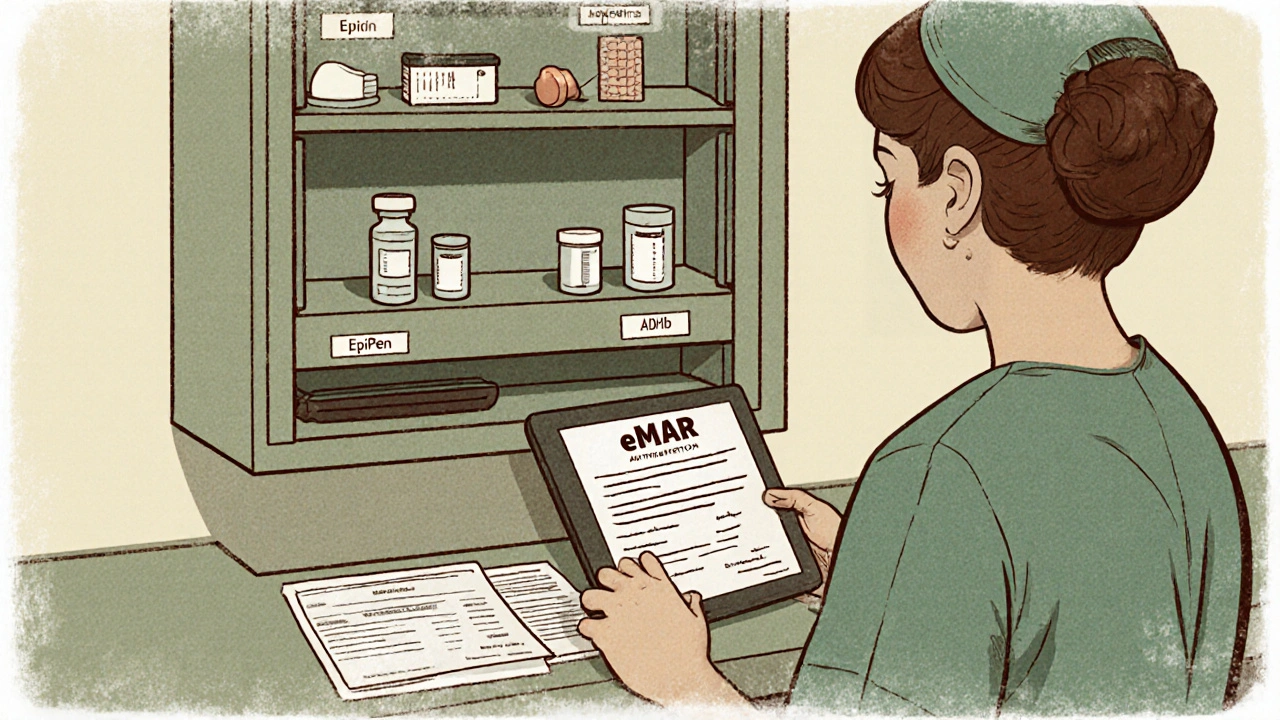
Can Your Child Self-Administer?
It depends on age, condition, and state law. In New York, a child can carry and use their own inhaler or EpiPen-but only if both the doctor and parent sign a special Self-Medication Release Form. California requires students to demonstrate competency by practicing with a nurse first. In most places, younger kids (under 10) are not allowed to self-administer, even if they’re capable.
Why the rules? Because even a 12-year-old can panic during an asthma attack and forget how to use the inhaler. Or a child with ADHD might forget to take their pill because they’re distracted. The goal isn’t to control kids-it’s to protect them. If your child is old enough and trained, ask the school nurse about self-administration options. It gives them independence and reduces stigma.
What Happens If Your Child Refuses Medication?
It happens. A lot. Kids don’t like taking pills. They feel different. They’re embarrassed. They think they’re fine today. The school nurse will try to encourage them. But if they still refuse, the nurse must call you. That’s not a glitch in the system-it’s the system working as designed.
Some schools now use apps that notify parents when a medication is given. In a 2023 pilot in California, this cut parent questions by 27%. But even with tech, human communication still matters. If your child refuses daily, talk to the school nurse. Maybe the dose causes nausea. Maybe they’re being teased. Maybe the pill is too big. There are solutions: liquid forms, chewables, or switching to a patch. But you have to speak up.
End-of-Year Cleanup: Don’t Forget This Step
When the school year ends, the medication doesn’t stay. Not even for a few weeks. Frederick County Schools and New York State require all unused or expired medications to be picked up by parents by August 31. If you don’t retrieve them, the school will dispose of them safely. No exceptions.
Why? Because storing old meds creates risk. Expired epinephrine doesn’t work. Old antibiotics can become toxic. And if a new student accidentally gets access to last year’s ADHD meds? That’s a legal and medical disaster.
So, mark your calendar. Two weeks before the last day of school, go to the nurse’s office and collect every pill, inhaler, and syringe. Take them home. Don’t leave them in the car. Don’t toss them in the trash. Bring them to a pharmacy drop-off or local take-back program.
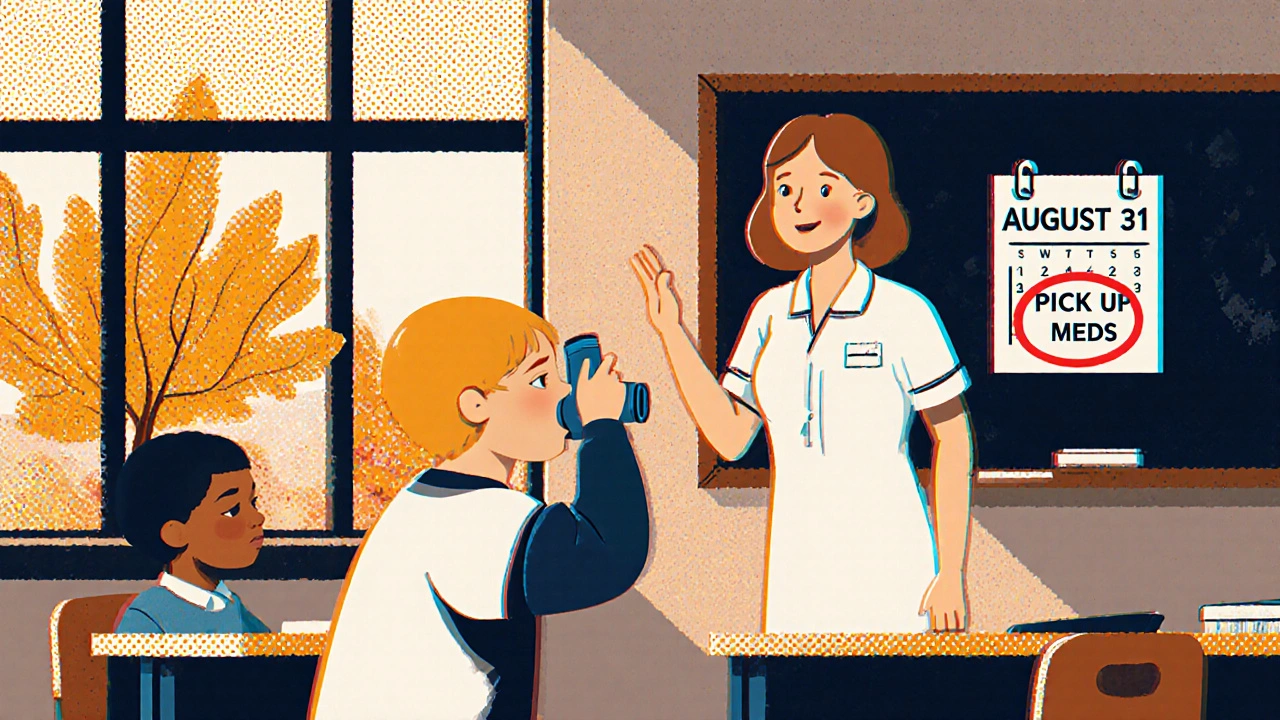
What to Do When Things Go Wrong
Even with perfect systems, mistakes can happen. If your child has a reaction-rash, vomiting, dizziness, trouble breathing-call the school immediately. Ask: Was the medication given correctly? Was it the right dose? Was it expired? Then call your doctor. Then call the school nurse again. Document everything.
According to the U.S. Department of Education, 41% of medication complaints from schools are because the medicine wasn’t given as prescribed. That’s not the nurse’s fault alone. Often, it’s because the form was outdated, the label was unclear, or the parent didn’t report a change. Your role is to be the bridge between doctor, school, and child. Keep records. Ask questions. Follow up.
What’s Changing in School Medication Safety
Things are getting better-but faster than most parents realize. By 2026, most states plan to standardize digital authorization forms. By 2028, some schools may use biometric verification-like a fingerprint scan-to confirm the right student gets the right medicine. That sounds high-tech, but it’s just preventing a kid from grabbing someone else’s inhaler.
Also, mental health meds are rising fast. Between 2023 and 2028, school requests for antidepressants and anti-anxiety medications are projected to jump 34%. Schools are working with pediatricians to create safer protocols for these drugs, especially since side effects like drowsiness or mood swings can affect learning.
And don’t forget the cost. The average school spends $1,200 a year on medication storage, training, and records. Larger districts save money by sharing nurses and systems. But the bottom line? Investing in safety saves lives-and money-in the long run.
Final Checklist for Parents
Before your child starts school, run through this:
- ✅ Doctor signed and dated authorization form with license number
- ✅ Parent signed consent form
- ✅ Medication in original, labeled, unexpired container
- ✅ Delivered in person to the nurse (not the child)
- ✅ Submitted by June 1 if possible
- ✅ Updated if dosage, timing, or side effects change
- ✅ Self-administration form if applicable
- ✅ Collected all meds by August 31
If you’ve done all this, you’ve done more than 80% of parents. You’ve protected your child. You’ve supported the school. And you’ve made sure your kid gets the care they need-right on time, every time.
Can the school give my child over-the-counter medicine like ibuprofen?
Yes-but only if you provide a signed authorization form from both the doctor and parent. Even common meds like ibuprofen or allergy pills require paperwork. Schools can’t give OTC meds without it, even if the child has taken them at home for years.
What if my child’s doctor won’t sign the form?
Some doctors may not be familiar with school forms. Ask the school nurse for a template. Most have standardized versions accepted by state guidelines. If your doctor refuses, ask for a phone call with the school nurse-they can explain the requirements. In most cases, a quick conversation clears it up.
Can the school refuse to give my child their medication?
Yes-if the paperwork is incomplete, expired, or the medication isn’t in the original container. Schools are legally required to follow strict rules. They can’t make exceptions for convenience. If you’re denied, ask for the specific reason. It’s usually fixable with updated forms or a new bottle.
Do I need to renew the medication form every year?
Yes. Most states require annual renewal, even if the medication hasn’t changed. The American Academy of Pediatrics recommends this because a child’s needs can shift. A dose that worked last year might not be right this year. Renewing ensures the school always has current, accurate information.
What if my child needs a shot at school?
Insulin, epinephrine, and some immunotherapy shots are common. The school nurse must be trained to give them. You’ll need a detailed order from the doctor, including injection site, volume, and timing. Some schools require a separate training session with the nurse before the first dose. Don’t assume they know how-ask early.
Are schools required to have a nurse on site every day?
No. Many schools share nurses across multiple buildings. But if your child needs daily medication, the school must have a plan: either a nurse is present when the med is given, or a trained staff member (like a teacher or aide) is designated and certified to administer it under the nurse’s supervision. Ask your school what their policy is.
Can I request to be notified every time my child gets their medication?
Yes. Many schools now offer text or app notifications when meds are given. If yours doesn’t, ask if they can add you to a daily log or email summary. You have the right to know whether your child received their treatment. Don’t assume they did-ask.
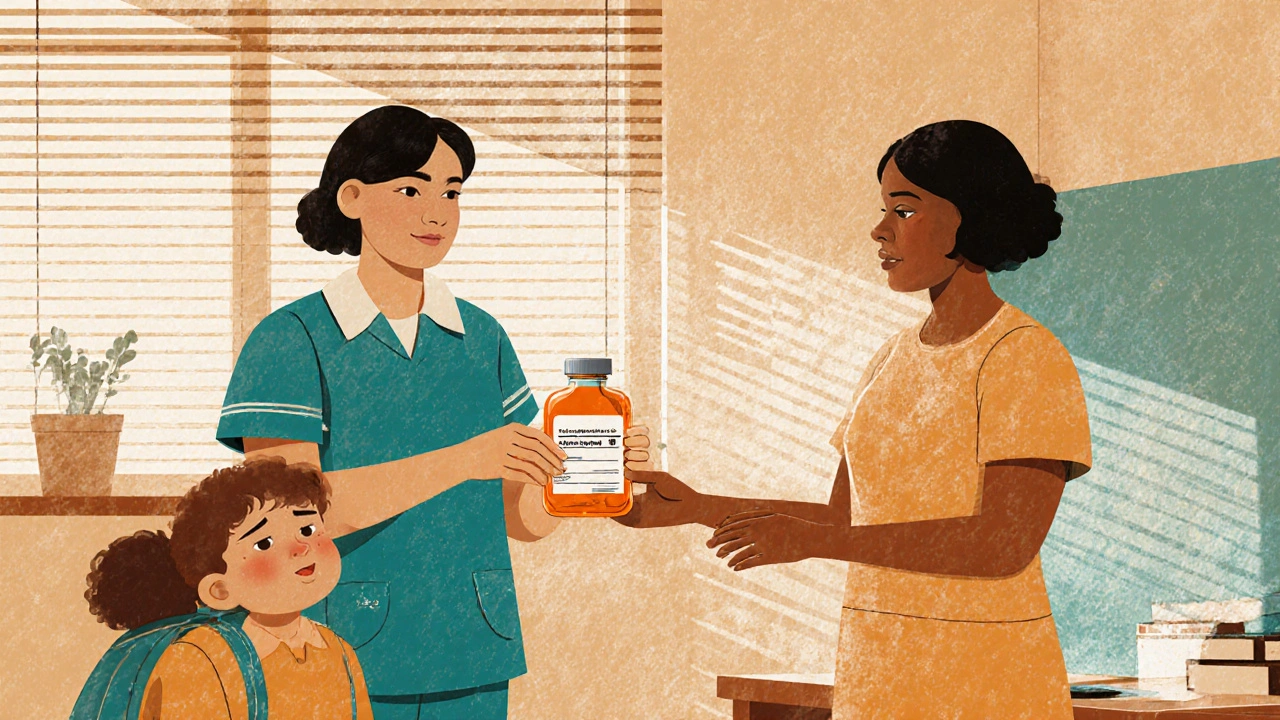
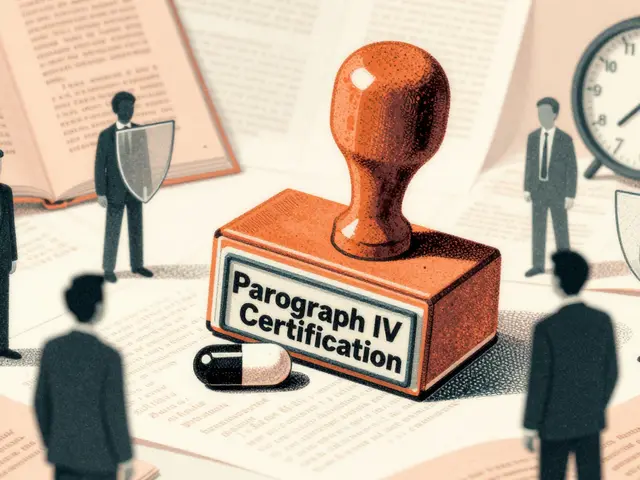
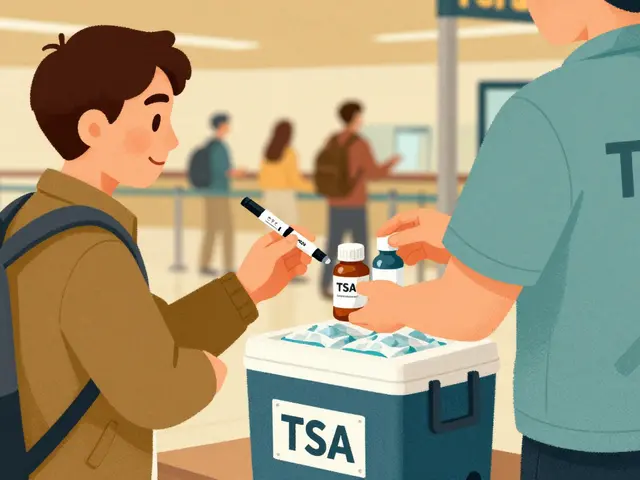



Denny Sucipto
November 18, 2025 AT 23:37My kid’s asthma inhaler got lost in the shuffle last year because I didn’t know about the June 1 deadline. Don’t make my mistake. Get that form in early, even if school hasn’t sent it yet. Nurse’s office is swamped in September, and your kid shouldn’t pay for your delay.
Heidi R
November 18, 2025 AT 23:59Why do schools even need to be involved? Just let parents handle it. If your kid can’t manage their own meds, maybe they shouldn’t be in public school.
Iska Ede
November 19, 2025 AT 09:14Oh wow, so now we’re treating kids like lab rats with fingerprint scans? Next they’ll be implanting microchips so the nurse knows when they took their Ritalin. 😂
steffi walsh
November 20, 2025 AT 00:38I love how this breaks it down so clearly. My daughter’s EpiPen was almost expired and I didn’t even realize until the nurse called. Now I have a calendar alert for every med renewal. You’re not just following rules-you’re saving lives. 💪❤️
Riohlo (Or Rio) Marie
November 20, 2025 AT 13:53It’s amusing how American schools have turned medication administration into a bureaucratic opera. In Dublin, we just hand the kid the pill and trust they won’t choke. The real issue isn’t paperwork-it’s the over-medicalization of childhood. You’ve turned a simple act of care into a compliance nightmare.
Holly Powell
November 21, 2025 AT 07:57The 5 Rights framework is non-negotiable, but the implementation variance across districts is a systemic failure. Without standardized eMAR integration and NACNS-certified personnel, you’re operating in a regulatory gray zone. The 18% error rate cited is statistically significant at p < 0.01.
Brenda Kuter
November 21, 2025 AT 18:20My son was humiliated last year because the nurse called me every time he refused his ADHD med. Now the whole class knows he’s ‘the pill kid.’ Why can’t they just let him take it in private? This isn’t safety-it’s public shaming.
Conor McNamara
November 22, 2025 AT 08:11did u kno that the govt is using these forms to track kids med use and build a database? i heard from a friend whos cousin works at the dept of ed that theyre linking it to school funding and future insurance rates. dont sign anything without a lawyer. also the label on the bottle? fake. they swap meds in the back. i saw it.
Leilani O'Neill
November 24, 2025 AT 02:28How is it acceptable that American parents are so incompetent they need a 12-step checklist just to give their child aspirin? In Ireland, we trust parents. We don’t need fingerprint scans to prevent a child from grabbing the wrong bottle. This isn’t safety-it’s institutionalized distrust.
Emanuel Jalba
November 24, 2025 AT 12:45MY SON WAS DENIED HIS MEDS BECAUSE THE BOTTLE HAD A SLIGHTLY FADED LABEL. I CRIED IN THE NURSE’S OFFICE. THEY COULD’VE JUST TAKEN A PHOTO. I’M NOT A CRIMINAL. I’M A MOM. 😭💔
Gabriella Jayne Bosticco
November 24, 2025 AT 17:58This is actually one of the most practical guides I’ve seen. I used to think all this paperwork was overkill-until my daughter had a seizure during gym and the nurse had to scramble because the form was outdated. Now I treat it like a passport renewal. Do it early, do it right.
Shaun Barratt
November 25, 2025 AT 22:26It is imperative to note that the storage requirements for refrigerated medications are codified under 42 CFR § 483.35, and failure to adhere to the 2°C–8°C range constitutes a violation of the Centers for Medicare & Medicaid Services’ Conditions of Participation. Noncompliance may result in loss of federal funding.
Sarah Frey
November 26, 2025 AT 19:14Thank you for writing this with such clarity. As a school nurse for 18 years, I’ve seen families struggle with this process-and I’ve also seen children suffer because the details were missed. This checklist? It’s not bureaucracy. It’s compassion with structure. Please share it with every parent you know.
Katelyn Sykes
November 28, 2025 AT 17:53Just had to update my son’s insulin dose and realized I forgot to submit the new form. Nurse called me at 7am-thank god. I thought I was being a good parent by waiting till the last minute. I was wrong. Do not wait. Do not assume. Do not hope. Just send the damn form.